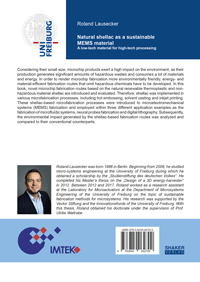
Shop : Details
Shop
Details
48,80 €ISBN 978-3-8440-6270-0Paperback172 Seiten75 Abbildungen305 g24 x 17 cmEnglischDissertation
November 2018
Roland Lausecker
Natural shellac as a sustainable MEMS material
A low-tech material for high-tech processing
In contrast to their small size, microchip products exert a considerably high impact on the environment, as indicated by a high material and energy consumption as well as a high generation of hazardous wastes. In order to render microchip fabrication more environmentally friendly, energy- and material-efficient fabrication routes that omit hazardous chemicals have to be developed. Therefore, the non-hazardous material shellac, a natural renewable thermoplastic secreted by lice, was employed within novel fabrication routes for microchip products within this thesis. Shellac exhibits beneficial material properties for “green” processing, such as its low glass transition temperature or solubility in ethanol and isopropanol, which enable energy-efficient and hazard-free shellac-based microfabrication processes.
In this thesis, shellac was implemented within various microfabrication processes, including hot embossing, solvent casting and inkjet printing, which were introduced to microelectromechanical system (MEMS) fabrication and applied within three different application examples, as the fabrication of microfluidic systems, neural probes fabrication and digital lithography, and evaluated for their environmental impact. Therefore, the relevant mechanical, thermal and rheological properties of shellac as well as the wetting behavior and the chemical resistance in contact to different solvents and wet etchants were determined. The microfabrication processes utilized for shellac were analyzed and optimized based on theoretical models and on the results obtained from the previous material characterization. Using the optimized parameters, shellac structures with minimum feature sizes of 20 µm could be successfully fabricated through hot embossing, whereas shellac patterns with linewidths of 45 µm were fabricated using inkjet printing. Within the application examples of shellac-based micromachining to MEMS fabrication, shellac enabled the fabrication of microfluidic test chips at low process temperatures, thereby reducing the energy demand of the employed hot embossing process in comparison to commercial thermoplastic materials. Through being temporarily embedded in shellac, silicon test chips for neural probe applications could be successfully connected to polymer cables with embedded metal connections using surface micromachining. By using inkjet printing of shellac-based inks, the masking of metal thin films during wet etching could be performed without hazardous chemicals typically used within conventional photolithography.
In this thesis, shellac was implemented within various microfabrication processes, including hot embossing, solvent casting and inkjet printing, which were introduced to microelectromechanical system (MEMS) fabrication and applied within three different application examples, as the fabrication of microfluidic systems, neural probes fabrication and digital lithography, and evaluated for their environmental impact. Therefore, the relevant mechanical, thermal and rheological properties of shellac as well as the wetting behavior and the chemical resistance in contact to different solvents and wet etchants were determined. The microfabrication processes utilized for shellac were analyzed and optimized based on theoretical models and on the results obtained from the previous material characterization. Using the optimized parameters, shellac structures with minimum feature sizes of 20 µm could be successfully fabricated through hot embossing, whereas shellac patterns with linewidths of 45 µm were fabricated using inkjet printing. Within the application examples of shellac-based micromachining to MEMS fabrication, shellac enabled the fabrication of microfluidic test chips at low process temperatures, thereby reducing the energy demand of the employed hot embossing process in comparison to commercial thermoplastic materials. Through being temporarily embedded in shellac, silicon test chips for neural probe applications could be successfully connected to polymer cables with embedded metal connections using surface micromachining. By using inkjet printing of shellac-based inks, the masking of metal thin films during wet etching could be performed without hazardous chemicals typically used within conventional photolithography.
Schlagwörter: microchips; microsystems; environment; microfabrication; sustainability
Verfügbare Online-Dokumente zu diesem Titel
DOI 10.2370/9783844062700
Sie benötigen den Adobe Reader, um diese Dateien ansehen zu können. Hier erhalten Sie eine kleine Hilfe und Informationen, zum Download der PDF-Dateien.
Bitte beachten Sie, dass die Online-Dokumente nicht ausdruckbar und nicht editierbar sind.
Bitte beachten Sie auch weitere Informationen unter: Hilfe und Informationen.
Bitte beachten Sie auch weitere Informationen unter: Hilfe und Informationen.
| Dokument |  | Gesamtdokument | ||
| Dateiart |  | |||
| Kosten |  | 36,60 € | ||
| Aktion |  | Zahlungspflichtig kaufen und anzeigen der Datei - 4,7 MB | ||
| Aktion |  | Zahlungspflichtig kaufen und download der Datei - 4,7 MB | ||
| Dokument |  | Inhaltsverzeichnis | ||
| Dateiart |  | |||
| Kosten |  | frei | ||
| Aktion |  | Anzeigen der Datei - 1,9 MB | ||
| Aktion |  | Download der Datei - 1,9 MB | ||
Benutzereinstellungen für registrierte Online-Kunden (Online-Dokumente)
Sie können hier Ihre Adressdaten ändern sowie bereits georderte Dokumente erneut aufrufen.
Benutzer
Nicht angemeldet
Export bibliographischer Daten
Shaker Verlag GmbHAm Langen Graben 15a52353 Düren
Mo. - Do. 8:00 Uhr bis 16:00 UhrFr. 8:00 Uhr bis 15:00 Uhr
Kontaktieren Sie uns. Wir helfen Ihnen gerne weiter.



